Six (6) DOE Fellows from Florida International University (FIU) participated in summer internships across the DOE Complex. As part of the DOE-FIU Science and Technology Workforce Development Program, DOE Fellows participated in the 10-week summer internships where they were paired with scientists and engineers at DOE Headquarters, DOE sites and DOE national laboratories. The DOE Fellows spent their summer working at DOE program offices or on environmental research projects under the guidance of their site mentors. At the conclusion of their internships, DOE Fellows will document their summer activities and results in a summer internship technical report and will have the opportunity to present their accomplishments during the annual DOE Fellow’s Poster Exhibition & Competition (held in October at FIU) and/or at the upcoming Waste Management Symposia to be held in 2014 in Phoenix, Arizona.
The DOE Fellows who participated in 2013 summer internships include:
DOE FELLOW: Paola Sepulveda
LOCATION: DOE-HQ EM-12 – Germantown
MENTOR: Mr. Skip Chamberlain
During the summer of 2013, Ms. Paola Sepulveda interned with the Office of Environmental Management at Department of Energy Headquarters in Germantown, Maryland. During this time, Paola assisted Mr. Kurt Gerdes, Director of the Office of Soil and Groundwater, EM-12. EM-12 supports EM’s mission by providing integration, planning, analysis, and guidance for ensuring safe and effective management and remediation of contaminated soil and groundwater with the goal of reducing risk and the life cycle cost of remediation. Her main role was to complete a database identifying DOE sites using pump and treat systems for groundwater remediation. Summarizing the area, contaminants present, costs, and year of operation. This database will eventually be used to update the End-States Analysis.
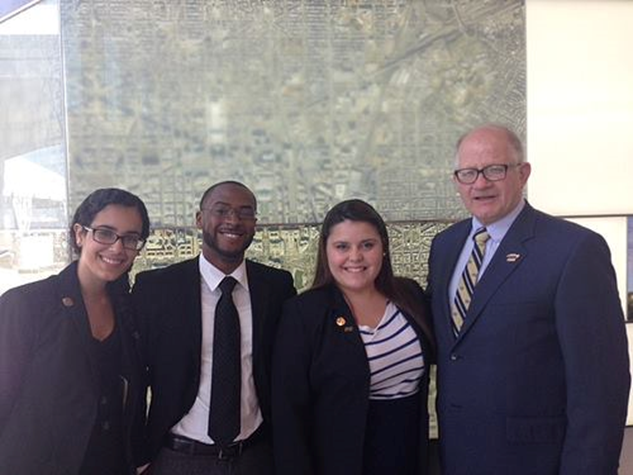
DOE Fellows DOE HQ interns, Paola Sepulveda, Joel McGill and Gabriela Vazquez (from left to right) meeting FIU President Dr. Mark Rosenberg
DOE FELLOW: Joel McGill
LOCATION: DOE-HQ EM-02 – Germantown
MENTOR: Mrs. Ana Han
During the summer of 2013, Mr. Joel McGill attended his internship at the Office of Environmental Management at Department of Energy Headquarters located in Downtown Washington DC (Forrestal Building). During this time, Joel supported Mrs. Ana Han Lead Foreign Affairs Specialist for the Office of the International Program, EM- 2.1. The International Program Office is responsible for facilitating and approving potential areas of collaboration between EM’s mission units/ National Labs and foreign entities, as well as awarding funding for said collaborative efforts. Mr. McGill’s primary directives were to attend meetings and report on those proceedings, as well as gather and develop briefing materials for overseas travels to foreign entities Russia and the UK by Senior Advisor of the Office of Environmental Management Mr. David Huizenga and Associate Principal Deputy Assistant Secretary Mrs. Alice Williams, respectively. The briefing files played a key role in the visits by DOE’s Executive officers.
Joel also participated in discussions/ meetings for overseas energy and nuclear technology relations with various countries that included DOE‘s EM, NNSA, EERE, and OPAB. In addition, Joel attended the DOE Overseas Corps Orientation Seminar 2013. In these meetings, a variety of topics were covered such as: nonproliferation, transport of spent nuclear fuel and radioactive waste, various storage methods for containing high-level radioactive waste, various methods and advancements in sustainable energy, and how to advocate for American companies to have an equal opportunity market abroad. These topics pertained to various projects with countries such as China, Korea, Japan, Germany and the UK.
Some of the administrative duties which he performed included QA/QC of documents, coordination of meetings and teleconferences, and contacting contractors and private industry executives/specialists for information. Joel also performed budgeting activities, including organizing travel expenses, outlining and calculating reimbursement funds, and reviewing and outlining project funding and available funds. He feels these duties and experiences have given him a very in depth look into the corporate world and is very grateful for the opportunity.
DOE FELLOW: Gabriela Vazquez
LOCATION: DOE-HQ EM-30 – Germantown
MENTOR: Mrs. Christine Gelles
During the summer of 2013, Ms. Gabriela Vazquez was given the opportunity to intern with the Office of Environmental Management (EM) at the Department of Energy (DOE) Headquarters, in Germantown, Maryland. During this time, Ms. Vazquez worked under the mentorship of Ms. Christine Gelles, Associate Deputy Assistant Secretary of the Office of Waste Management (EM-30) and Mr. Douglas Tonkay, Director of the Office of Disposal Operations (EM-31). With the collaboration of Mr. Jaime Joyce, a general engineer from the Office of Disposal Operations, Gabriela conducted research that summarizes past and current treatment technologies available from U.S. private sector vendors to treat low level waste (LLW) and mixed low level waste (MLLW). This research focused on identifying and expanding on treatment technologies used in the past or currently available within the U.S. that might be useful to other nations to treat their orphan wastes. Additionally, this research names which U.S. orphan waste streams either do not have a technology available for treatment or whose treatment pathway is not cost effective; this identification can lead to international collaboration to develop a treatment process pathway for disposal for these orphan waste streams.
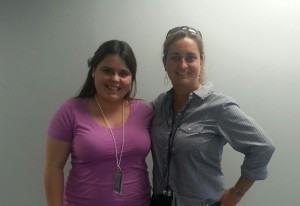
DOE Fellow Gabriela Vazquez (left) with Associate Deputy Assistant Secretary of the Office of Waste Management (EM-30)
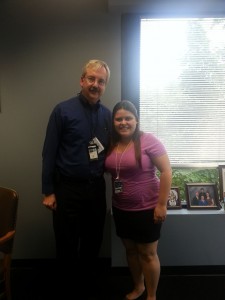
DOE Fellow Gabriela Vazquez (right) with Mr. Douglas Tonkay, Director of the Office of Disposal Operations (EM-31)
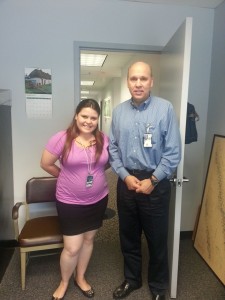
DOE Fellow Gabriela Vazquez (left) with Mr. Jaime Joyce, a general engineer from the Office of Disposal Operation
DOE FELLOW: Valentina Padilla
LOCATION: Savannah River National Lab, Aiken, SC
MENTOR: Dr. Miles Denham
Ms. Valentina Padilla was given the opportunity to intern with Savannah River National Laboratory under the mentorship of Dr. Miles Denham. During her visit, she took several samples from the wells in the F-area of the site. In 2010, ARCADIS initiated monthly molasses injections into these wells in order to create a reduced zone that will facilitate the bioremediation of uranium [U(VI)]. The sampling of these wells is important in order to understand the changes that have occurred to the underground water and soil. These results will help demonstrate the viability of the technology as a long term solution for in situ remediation of the site.
To further contribute to the research, Valentina also performed a microcosm study using core samples from the F-area that will provide useful information about the mineralogical changes caused by the molasses addition.
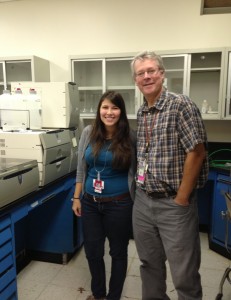
DOE Fellow intern Valentina Padilla with summer mentor (Dr. Miles Denham) at SRNL
DOE FELLOW: Dayron Chigin
LOCATION: Washington River Protection Solutions, Hanford Site, Richland, WA
MENTOR: Mr. Ruben Mendoza
During the summer of 2013, Mr. Dayron Chigin participated in a 10-week summer internship at the United States Department of Energy’s Hanford Site in Richland, Washington. Dayron started his internship at Washington River Protection Solutions (WRPS) under the mentorship of Mr. Ruben Mendoza. Throughout his internship, Dayron is supporting his mentor’s group, Waste Transfer and Storage Engineering, in order to address the issue of retrieving, treating, storing, and ultimately disposing of the approximately 53,000,000 gallons of nuclear and chemical waste stored in single and double shell tanks at the site. Within the group, Dayron is responsible for the creation, revision, and implementation of technical and analytical procedures for the sensors along the storage transfer lines from the 242A Evaporator to the Liquid Effluent Retention Facility (LERF). The sensors within these transfer lines are used to detect any leaks. Without proper configuration or preventative maintenance (PM) implemented, sensor readings could be inconsistent and possible soil and water radiological contamination could occur and produce harmful results to the surrounding environment. Dayron plays a crucial role in future environmental and safety goals for WRPS.
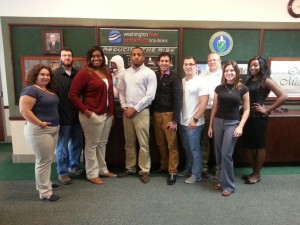
DOE Fellows Dayron Chigin (fourth from the right) and Jennifer Arniella (second from the right) with fellow URS interns at Washington River Protection Solutions, Office of River Protection, Richland, Washington
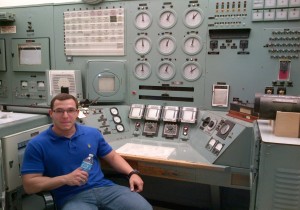
DOE Fellow Dayron Chigin, U.S. Department of Energy’s B Reactor Control Room (built in 1943). Richland, Washington
DOE FELLOW: Jennifer Arniella
LOCATION: Hanford Site
MENTOR: Mr. Dennis Washenfelder
During the summer of 2013, Ms. Jennifer Arniella participated in a 10-week summer internship at Washington River Protection Solutions at the Hanford Site, Richland, WA. She is worked under the supervision of Mr. Dennis Washenfelder in the Tank and Pipeline Integrity Team. Her project involves organizing, graphing and analyzing data taken from corroded/eroded pipelines in order to find their life expectancy. Tank farms have implemented a Fitness-for-Service (FFS) program which determines the integrity of the waste transfer system. The FFS information is acquired from opportunistic evaluations of pipelines that have been removed from service. Eventually, all of the waste transfer system’s pipeline materials and materials handling history will be represented. These include: 2-in and 3-in carbon steel and stainless steel process lines; 4-in and 6-in carbon steel encasements; 2-in and 3-in carbon steel and stainless steel jumpers, including wide radius elbows, 5-in diameter elbows, and straight sections; and slurry and supernatant waste materials. This analysis will accurately determine the operational life of all the waste transfer lines underground and will allow prediction of the proper design allowances in replacement piping and jumpers.
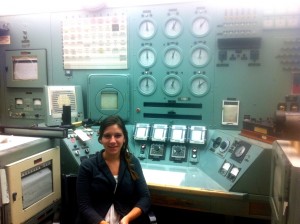
DOE Fellow Jennifer Arniella at the U.S. Department of Energy’s B Reactor Control Room, built in 1943. Richland, Washington
Tags: Internships
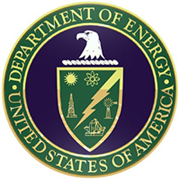
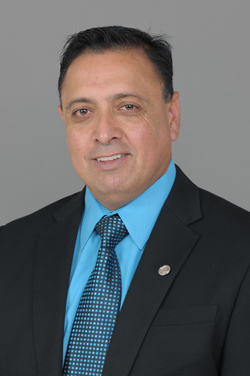 I wanted to let you know about an incredible opportunity made possible to FIU minority students thanks to the sponsorship and funding of the US Department of Energy’s Office of Environmental Management (DOE-EM). In an effort to overcome the challenges of an aging workforce, DOE-EM is actively and aggressively targeting college students across the US to enter DOE’s workforce.
I wanted to let you know about an incredible opportunity made possible to FIU minority students thanks to the sponsorship and funding of the US Department of Energy’s Office of Environmental Management (DOE-EM). In an effort to overcome the challenges of an aging workforce, DOE-EM is actively and aggressively targeting college students across the US to enter DOE’s workforce.